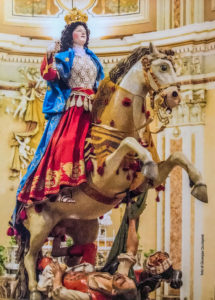 On the last Saturday of May the Madonna a Cavallo (Madonna on Horseback) is celebrated in Scicli. This very important feast celebrates the liberation of Christians from Arab rule.
On the last Saturday of May the Madonna a Cavallo (Madonna on Horseback) is celebrated in Scicli. This very important feast celebrates the liberation of Christians from Arab rule.
In 1091 Roger I of Sicily and his army freed Scicli from the Saracens, but they didn’t do it all by themselves… The Madonna on horseback came to their aid. Also known as the Madonna delle Milizie (Madonna of the Militia), she miraculously appeared and took part in the final battle. This incredible event could not be forgotten, so it is still celebrated every year.
In her honour, the town is decorated with lights and all the citizens participate in long processions; it is the only feast in the world where a warrior virgin is celebrated.
A play is also put on that tells the story of the battle and the miraculous appearance. To mark this day for remembering the Virgin’s miraculous intervention, typical desserts are prepared called Teste di Turco (“Testi Turcu” in dialect), meaning Turkish Heads. These desserts are an ideological trophy. In fact, their shape is reminiscent of the turbans that covered the heads of the defeated invaders. Despite their inspiration, they are delicious pastry puffs filled with ricotta cheese or custard.